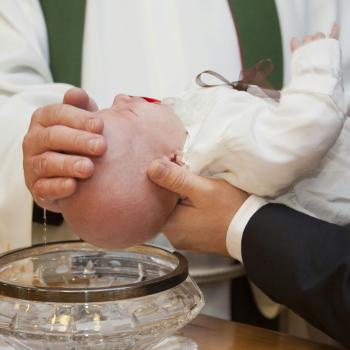In November, "Faithful Citizenship" will explore the problem of hunger around the world and at home, with the ONE movement's campaign against famine as an organizing focus, and our festive celebration of Thanksgiving as contrast. Bono recently wrote that the famine in the Horn of Africa is the worst in twenty years (the United Nations concurs), and that we must all pull together now and take action. Today, I'd like to gather some of the theological elements for why we must take action, and in honor of Bono and ONE, I'd like to do so with a slightly-revised excerpt from my book We Get to Carry Each Other: The Gospel according to U2 (used by permission of Westminster John Knox Press).
We have heard Bono speaking about his understanding of Jesus, that Jesus represents for us the will of God expressed in its most human way. But what is it that Jesus does? The New Testament scholar and Anglican bishop N. T. Wright says that Jesus inaugurates for us a quest for peace and justice. In his apologetic book Simply Christian, Wright begins by talking first about justice because, he says,
It is important to see, and to say, that those who follow Jesus are committed, as he taught us to pray, to God's will being done 'on earth as it is in heaven.' And that means that God's passion for justice must become ours too. When Christians use their belief in Jesus as a way of escaping from that demand and challenge, they are abandoning a central element in their own faith.
For Wright, that central element is what scholars call "the kingdom teachings" of Jesus, which he discussed in parables and acted out in healing and feeding miracles. In this understanding, the kingdom teachings and actions of Jesus are intended to show us how to live. In a recent talk, I heard Wright affirm that it is in the life of the flesh-and-blood Jesus that we best understand God and God's kingdom and assert that Jesus' identity cannot be understood apart from the kingdom teachings.
The kingdom of God/kingdom of heaven seems to have both a present and a future meaning when Jesus talks about it in the Gospels. In the Gospel of Luke, for example, when Jesus casts out demons, he tells people that "the kingdom of God has come to you" (the Greek verb epthasen suggests "is here" or "has arrived").
This links Jesus' work of healing with God's kingdom and suggests that, with Jesus, the reign of God has begun. But clearly it has not been concluded; you don't have to look around very hard to see that even though Jesus taught and healed and fed people, even though people of faith today may be trying to act with kindness and compassion, the world is still a mess. The kingdom has, simultaneously, past, present, and future orientations. Although Jesus has begun God's work, and we are to continue it, a time is coming when that work will be complete, when God will truly rule on earth as he does in heaven, when God's tide of peace and justice will roll across the whole planet.
The name for the theological talk about the end of things, the time when we trust that God's reign will come in fullness, is "eschatology," which comes from the Greek words meaning "talk of last things." The coming perfection of the world is an important element of faith, and we do see the impulse toward eschatology in U2 songs like "Still Haven't Found What I'm Looking For," "Where the Streets Have No Name," and "The Playboy Mansion" ("Then there will be no time for sorrow / Then there will be no time for shame"). In the world to come, at the time when God perfects all things, then we will find what we're looking for, street names won't matter, and there will be no time for sorrow.
These are beautiful teachings. But when the "then/now" balance of understanding the kingdom teachings is skewed entirely to the future end of the seesaw, we won't act in the present, which is what the kingdom teachings seem to require. In the Gospel of Mark, when Jesus begins his ministry by talking about the kingdom, he links us to it: "Now after John was arrested, Jesus came to Galilee, proclaiming the good news of God, and saying, 'The time is fulfilled, and the kingdom of God has come near; repent, and believe in the good news'" (Mark 1:14-15). That is, we are called to "repentance" (that metanoia or transformation we have been talking about) because the kingdom has come near; Jesus' teaching of the kingdom requires action from us.





